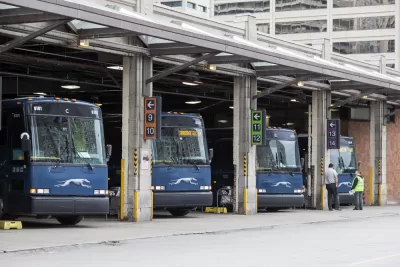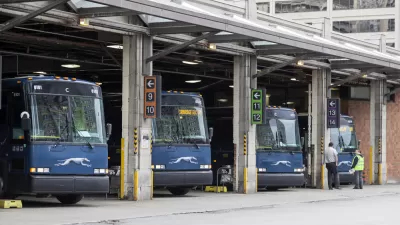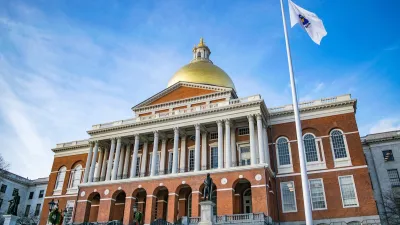Although intercity buses provide a crucial service to millions of Americans, the industry has been shut out of recent pandemic assistance programs while riders continue to experience dismal facilities and shrinking service options.

Despite serving twice as many customers as Amtrak, intercity bus service did not receive direct aid during the pandemic from either the CARES Act or the American Rescue Act, writes Jake Blumgart. "For tens of millions of Americans, intercity bus companies like Greyhound, Megabus, and myriad smaller actors are an essential part of the nation’s transportation system." These services "have long served as a lifeline to areas without train or plane service, and for riders who don’t have access to a car. It is an essential service for rural America, for students, and for low-income people."
Because bus travel primarily serves disadvantaged groups, "advocates say that further federal aid should be extended to their mode of travel, as it was for so many others earlier in the pandemic. Failing that, local and, especially, state policymakers could help to fill the gap."
Unlike other transportation industries, the deregulation of intercity bus travel in the 1980s "did not spur a surge of new entrants or innovation. Instead, Greyhound gobbled up many of its big competitors while downsizing its operations" before going bankrupt in 1990. "Today, very few operators are stopping on the side of a country road. Although Greyhound is still the largest motorcoach company, it is a shadow of its former self and the newer competitors that finally started to emerge in the 2000s were largely non-union."
This year, as the Delta variant started to spread, only roughly 60 percent of riders have returned to intercity buses, and the companies are still struggling to rebuild. Blumgart argues that "[t]he industry never saw the public intervention that surrounds rail and airline travel because, for the most part, both its riders and its operators are unheard in policy circles." But even in the absence of federal aid, "[b]us advocates say that local officials can ensure riders have access to decent facilities," such as accommodations beyond city sidewalks or parking lots with no shelter from the elements.
FULL STORY: Intercity Bus Service Gets No Respect from Government

Planetizen Federal Action Tracker
A weekly monitor of how Trump’s orders and actions are impacting planners and planning in America.

San Francisco's School District Spent $105M To Build Affordable Housing for Teachers — And That's Just the Beginning
SFUSD joins a growing list of school districts using their land holdings to address housing affordability challenges faced by their own employees.

The Tiny, Adorable $7,000 Car Turning Japan Onto EVs
The single seat Mibot charges from a regular plug as quickly as an iPad, and is about half the price of an average EV.

With Protected Lanes, 460% More People Commute by Bike
For those needing more ammo, more data proving what we already knew is here.

In More Metros Than You’d Think, Suburbs are Now More Expensive Than the City
If you're moving to the burbs to save on square footage, data shows you should think again.

The States Losing Rural Delivery Rooms at an Alarming Pace
In some states, as few as 9% of rural hospitals still deliver babies. As a result, rising pre-term births, no adequate pre-term care and "harrowing" close calls are a growing reality.
Urban Design for Planners 1: Software Tools
This six-course series explores essential urban design concepts using open source software and equips planners with the tools they need to participate fully in the urban design process.
Planning for Universal Design
Learn the tools for implementing Universal Design in planning regulations.
Smith Gee Studio
City of Charlotte
City of Camden Redevelopment Agency
City of Astoria
Transportation Research & Education Center (TREC) at Portland State University
US High Speed Rail Association
City of Camden Redevelopment Agency
Municipality of Princeton (NJ)




























